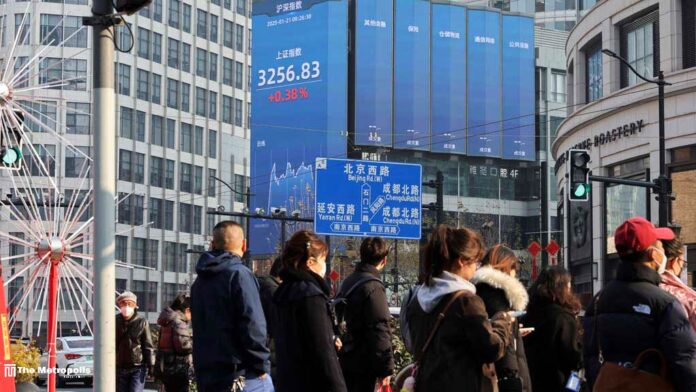China’s markets reopened on Wednesday after a week-long break, facing renewed trade tensions with the United States and volatility in the global artificial intelligence sector. Investors are closely monitoring Beijing’s response to boost market confidence.
Early indicators suggest a stable opening for mainland stock markets, as the newly imposed U.S. tariffs are lower than initially feared. Relief was evident in Hong Kong, where Chinese stocks surged this week. Optimism surrounding China’s AI firm DeepSeek is also expected to lift the sector’s stocks.
However, investors are awaiting policy signals from Beijing that could shape market direction. Analysts highlight that one of the first such indicators will come from the central bank’s fixing of the yuan (CNY=CFXS), which determines the currency’s trading band for the day.
During former U.S. President Donald Trump’s first term, a weaker yuan helped mitigate tariff impacts. The latest currency fix could provide insight into China’s stance on trade negotiations.
Mainland markets are also expected to take cues from Hong Kong, where stocks rebounded strongly despite Trump’s decision to impose 10% tariffs on Chinese imports.
During China’s Lunar New Year holiday, key developments unfolded. Over the weekend, Trump introduced tariffs on Chinese goods, prompting Beijing to announce retaliatory duties on U.S. imports and signal potential sanctions against companies such as Google.
Trump’s tariffs, which also targeted Mexico and Canada, disrupted global markets. The AI sector, a major driver of stocks over the past year, was also shaken when China’s DeepSeek introduced a more affordable AI model just before the holiday break, triggering a selloff in technology stocks.
Despite the tensions, markets found some reassurance. While Trump described the tariffs as an “opening salvo,” they were lower than previous threats. Additionally, he granted temporary relief to Mexico and Canada, raising hopes that China might negotiate a similar deal.
Trump and Chinese President Xi Jinping are expected to engage in talks, although the timing remains uncertain. “Any indication that Xi and Trump have a constructive conversation or commit to trade discussions would act as a temporary truce and support sentiment,” said Christopher Wong, a currency strategist at OCBC Bank.
Optimism that Beijing will introduce economic support measures, relief over the lower-than-expected tariffs, and enthusiasm for AI and electric vehicles fueled gains in Hong Kong markets.
Chinese companies listed in Hong Kong climbed more than 4% this week to a three-month high, with technology heavyweights surging nearly 7%.
Since January 27, when mainland markets closed for the holiday, the offshore yuan has depreciated by 0.6% against the dollar, hitting a record low. The onshore yuan last closed at 7.2469.
Analysts suggest that if China allows further yuan depreciation, it could signal expectations of a prolonged trade war, mirroring its approach during Trump’s first term in 2018 to offset tariff impacts.
“Overall, a trade war is not ideal for markets… but investors are less likely to panic this time,” said Elizabeth Kwik, investment director of Asian equities at abrdn, adding that markets have been pricing in trade risks for months.
“The Hong Kong market is closely linked to China, so movements should align. The market reaction should not be overly negative.”
AI Rally
AI-related stocks are expected to surge as they catch up with gains in Hong Kong, where local tech firms benefited from DeepSeek’s developments.
On Tuesday, China’s leading chipmaker SMIC soared 8.5% to a record high in Hong Kong, while Hua Hong Semiconductor jumped 12.7%.
DeepSeek’s advancements “offer reasons for greater optimism about China’s domestic AI firms” despite U.S. technology restrictions, said Jason Chan, senior investment strategist at Bank of East Asia. He added that their lower valuations compared to global peers could provide further momentum.
China’s CSI300 blue-chip index dropped 3% in January as investors grew concerned over macroeconomic uncertainty and Beijing’s restrained policy response.
Amid slowing economic growth and trade risks, investors believe China’s policymakers may be compelled to introduce stronger economic support measures.
“China must address domestic challenges, including real estate and consumer spending, to strengthen economic fundamentals, regardless of how the tariff dispute unfolds,” said Kwik.



